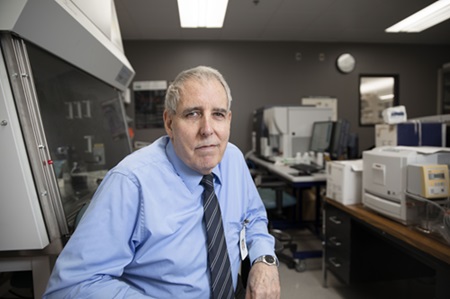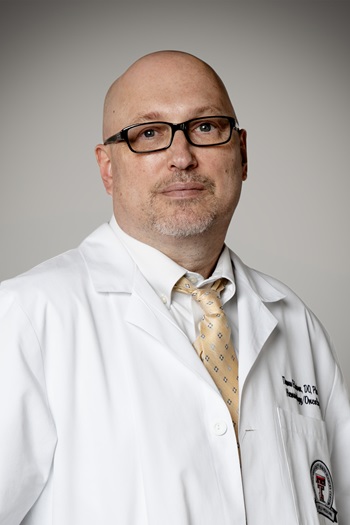Clinical Trials Provide Access to Latest Cancer Interventions
TTUHSC builds on the past to help patients now and in the future

A clinical trial is a type of research study that investigates new drugs, treatment procedures and medical devices before they are approved and made available to patients. These studies help determine if the new drug or procedure is safe, works well and improves on today’s standard treatments. In doing so, clinical trials are an important tool that can be crucial in developing novel treatments for complicated diseases such as cancer.
In the U.S., the Food and Drug Administration (FDA) has defined four phases to a clinical trial. During phase 1 trials, the intervention’s safety is initially tested in small groups of patients. Phase 2 clinical trials evaluate effectiveness, while phase 3 compares the new intervention to those already on the market. The final step, phase 4, tracks any potential long-term effects following approval by the FDA or another regulatory entity.
LAYING A FOUNDATION
Beginning in 2008, the Texas Tech University Health Sciences Center (TTUHSC), through its School of Medicine Cancer Center (renamed as the School of Medicine Pediatric Cancer Research Center in 2025), has conducted multiple phase 1 oncology clinical trials for pediatric and adult cancer patients. C. Patrick Reynolds, M.D., Ph.D., director of the School of Medicine Pediatric Cancer Research Center, said these phase 1 trials have largely been studies in which TTUHSC sponsored the Investigational New Drug (IND) application with the FDA.

“In some cases, such as our current pediatric phase 1 clinical trial of nanoliposomal irinotecan (SPOC 20212-001), the drug was from a drug company — originally Merrimack, then Ipsen,” Reynolds said. “So Ipsen is the drug sponsor, but I hold the IND for that trial with the FDA.”
For other trials managed by the School of Medicine Pediatric Cancer Research Center — oral fenretinide, intravenous fenretinide and intravenous safingol — TTUHSC was the drug sponsor, and either Reynolds or Barry Maurer, M.D., Ph.D., the center’s program leader for developmental therapeutics, holds the INDs with the FDA. In addition, Min Kang, Pharm.D., the center’s associate director, conducted the pharmacokinetic studies for all of these drugs in her pharmacology core lab. Pharmacokinetic studies evaluate how well the body absorbs, breaks down and expels a drug.
TTUHSC’s first phase 1 trials were conducted using intravenous fenretinide in adult hematological malignancies and a companion trial in adult solid tumors. These trials were initiated at the California Cancer Consortium when Reynolds, Kang and Maurer were at Children’s Hospital Los Angeles. After they moved to TTUHSC, they opened, completed and published both trials at the university.
“When the research paper on hematological malignancies was published, it included a Lubbock patient who had a rather remarkable response, and she had a major improvement in quality of life due to that phase 1 study,” Reynolds recalled.
Reynolds said TTUHSC acted as the drug sponsor for a pediatric phase 1 trial of oral powder fenretinide, which was focused on neuroblastomas. The trial was carried out in conjunction with the New Approaches to Neuroblastoma Therapy (NANT) Consortium, a group of closely collaborating investigators from universities and children’s hospitals with laboratory programs developing novel therapies for high-risk neuroblastomas. Mauer was the study chair for that pediatric phase 1 study, which had multiple complete responses in patients with recurrent neuroblastoma.
Reynolds and TTUHSC also started the South Plains Oncology Consortium (SPOC), a group of institutions which conduct adult and pediatric phase 1 and phase 2 studies. Reynolds said SPOC worked to complete the California Cancer Consortium adult trials and then went on to conduct other clinical trials, with the phase 1 and 2 studies conducted through a collaboration between the School of Medicine Pediatric Cancer Research Center, University Medical Center (UMC), Covenant Health, UT Southwestern Medical Center (UTSW) and the University of Oklahoma.
Because most adult oncology investigators became more interested in industry-sponsored trials than investigator-initiated clinical trials, Reynolds said SPOC stopped developing adult phase 1 trials. Currently, the consortium has only one pediatric phase 1 trial open (nanoliposomal irinotecan), which is close to being completed. The SPOC-member institutions that have collaborated with the TTUHSC School of Medicine Pediatric Cancer Research Center on that trial include UTSW, the University of Oklahoma, the Medical College of Wisconsin, M.D. Anderson and Cincinnati Children’s Hospital.
“We have been conducting preclinical studies with a drug from AstraZeneca, (AZD1390, an ATM protein inhibitor) and as a result, AstraZeneca is doing a phase I pediatric trial,” Reynolds said. “We recommended this be done in the Children’s Oncology Group’s (COG) National Cancer Institute-funded phase 1 consortium known as PEP CTN (Pediatric Early Phase-Clinical Trial Network), which we are not a member of due to the small number of patients here. However, PEP CTN chose our own Dr. Erin Barr as study chair for this phase 1 study titled PEPN2416, which enabled her to also open that phase I trial here at TTUHSC, providing access to this new therapy to patients in our region.”
Reynolds said the most impactful clinical trials are phase 3, and the School of Medicine Pediatric Cancer Research Center has been involved in multiple phase 3 trials and studies. These were conducted by the COG, Reynolds’ laboratory and TTUHSC’s flow cytometry core lab directed by Kang.
“Dr. Kang carries out assays for multiple national COG phase 3 clinical trials, which do enroll patients from TTUHSC,” Reynolds said. “The (School of Medicine) Pediatric Cancer Research Center also supports phase 2 clinical trials in the COG and in the NANT consortium. Results from the most recent COG neuroblastoma phase 2 clinical trial we were involved with were presented as an oral presentation at the 2025 American Society of Clinical Oncology annual meeting this spring.”
CANCER CARE CLOSER TO HOME

Hutson is an experienced clinical trialist and clinical investigator who has been involved in hundreds of clinical trials. He also has served in leadership roles in various internationally known clinical research entities such as the Sarah Cannon Research Institute, considered by many to be the premier clinical research institute that conducts first-in-human trials to phase 3 registrational trials.
“Clinical trials are essentially the pathway in medicine where new therapies and advances in existing therapies are proven to be truly advanced,” Hutson said. “We want the UMC TLC2 Foundation Cancer Center to be a training center of excellence for physicians involved in every aspect of cancer treatment, including research; the future of a cancer cure is research.”
Hutson said there are several types of cancer centers, the most common of which is a community cancer center where patients receive the approved therapy. Often associated with a doctor's office, these are the best cancer treatment facilities in many regions.
With the UMC TLC2 Foundation Cancer Center, TTUHSC is developing a different type of cancer facility: an academic cancer center where patients can expect to receive the best, up-to-date standard of care while also having access to new potential standards of care through clinical trials.
“My area of expertise is kidney cancer; I have been involved in more than 10 drug approvals in kidney cancer since I started more than 25 years ago,” Hutson said. “I’ve led phase 3 trials, and patients that I've been taking care of have been able to get access to therapies that absolutely became the new standard of care. They got all the benefits of longer survival and improved outcomes from therapy years before those therapies were available on the market. That's the advantage of an academic cancer center.”
TTUHSC’s School of Medicine Pediatric Cancer Research Center focuses its research and clinical trials primarily on pediatric oncology. Though it doesn't administer cancer therapies to patients, per se, it conducts many important laboratory research studies and designs and works with consortia to carry out clinical trials. While the UMC TLC2 Foundation Cancer Center has a pediatric cancer component, its primary focus is adult oncology. It is engaged with partner academic cancer institutions across the country, participating in and conducting large studies to push the treatment envelope forward.
The UMC TLC2 Foundation Cancer Center also is expanding its expertise in adult oncology by attracting and recruiting faculty who are experts in specific cancer types. Hutson said these are among the reasons TTUHSC and the UMC TLC2 Foundation Cancer Center are attractive to pharmaceutical companies seeking to conduct clinical trials.
“If there's an academic doctor who is an expert in their field, the pharmaceutical companies want that doctor to be involved in their trial,” Hutson said. “They don't give these trials to the general medical oncologist; these are trials that are done at academic medical centers under the direction of experts in the field, which we have at TTUHSC and the UMC TLC2 Foundation Cancer Center.”
Because a strong academic cancer center has not been previously available in West Texas, access to these types of pharmaceutical clinical trials has been lacking. Hutson said that’s why he was recruited to TTUHSC: To build an academic cancer center in a partnership between TTUHSC and UMC.
“The UMC TLC2 Foundation Cancer Center building that's opening next year is going to be an academic cancer center,” Hutson said. “We are in the midst of recruiting and already have five new academic oncologists hired, starting in the fall. We also are working to partner with pharmaceutical companies that have expressed interest in coming to TTUHSC now that we have an academic program. They are bringing their new drug development assets for us to help them develop. All of this will help us offer more clinical trials and to be that regional academic medical center so that our patients in West Texas don't have to drive six or seven hours to Dallas-Fort Worth or go to Houston to have access to the latest treatments.”
Related Stories
National Academy of Inventors Names TTUHSC Faculty Senior Members
The National Academy of Inventors (NAI) has designated two current and one former TTUHSC faculty researchers as Senior Members.
TTUHSC Cancer Researcher Honored by National Academy of Inventors
C. Patrick Reynolds, M.D., Ph.D., director of the School of Medicine Pediatric Cancer Research Center at TTUHSC, has dedicated his life as a researcher to developing treatments for childhood cancers.
TTUHSC’s Hudson Set to Serve as President for Society of Clinical Research Associates
The Society of Clinical Research Associates (SOCRA) has elected Texas Tech University Health Sciences Center’s (TTUHSC) Catherine Hudson, Dr.P.H., as its president for 2025-2026.
Recent Stories
National Academy of Inventors Names TTUHSC Faculty Senior Members
The National Academy of Inventors (NAI) has designated two current and one former TTUHSC faculty researchers as Senior Members.
The John Wayne Cancer Foundation Surgical Oncology Fellowship Program at Texas Tech University Health Sciences Center Announced
TTUHSC is collaborating with the John Wayne Cancer Foundation and has established the Big Cure Endowment, which supports the university’s efforts to reduce cancer incidence and increase survivability of people in rural and underserved areas.
TTUHSC Receives $1 Million Gift from Amarillo National Bank to Expand and Enhance Pediatric Care in the Panhandle
TTUHSC School of Medicine leaders accepted a $1 million philanthropic gift from Amarillo National Bank on Tuesday (Feb. 10), marking a transformational investment in pediatric care for the Texas Panhandle.
